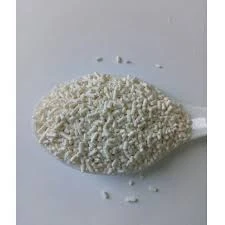
kieserite fertilizer
Kieserite Fertilizer An Overview and Benefits for Agriculture
Kieserite, a naturally occurring mineral, has gained attention in agricultural practices due to its rich magnesium content and efficacy as a fertilizer. Its scientific formula, MgSO₄·H₂O, indicates that it consists mainly of magnesium sulfate in a hydrated form. This unique composition makes kieserite a valuable resource for enhancing soil fertility and promoting healthy plant growth.
The Importance of Magnesium in Agriculture
Magnesium is an essential nutrient for plants, playing a crucial role in various physiological processes. It is a central component of chlorophyll, the pigment responsible for photosynthesis. Without sufficient magnesium, plants cannot effectively convert sunlight into energy, leading to impaired growth and reduced crop yields. Additionally, magnesium contributes to enzyme activation, synthesis of nucleic acids, and the overall structural stability of plant cells.
Deficiency in magnesium can manifest through symptoms like interveinal chlorosis, leaf curling, and poor fruit development. These symptoms not only affect the health of the plants but can also result in significant economic losses for farmers. Thus, ensuring adequate magnesium levels in the soil is vital for sustaining productive agriculture.
Properties and Benefits of Kieserite
Kieserite offers several advantages as a magnesium fertilizer. First and foremost, it is a slow-release source of magnesium, which means that it steadily provides nutrients to plants over an extended period. This feature minimizes the risk of nutrient leaching and promotes better utilization by crops.
Moreover, the sulfate component of kieserite enhances the uptake of magnesium by plants, as sulfur is another essential nutrient that aids in the formation of important amino acids and proteins. This synergistic effect ensures that crops receive a more balanced supply of nutrients, resulting in healthier and more robust plants.
Kieserite is particularly beneficial for specific crops that have high magnesium requirements, such as tobacco, potatoes, and various fruit-bearing plants. By applying kieserite, farmers can potentially increase both the quantity and quality of their harvests, leading to improved marketability and profitability.
kieserite fertilizer

Application Methods
The application of kieserite can be done in various ways, depending on the specific needs of the crops and the soil conditions. Granular kieserite can be broadcasted over the soil or incorporated into the topsoil before planting. It may also be added to the water during irrigation in a dissolved form, allowing for more precise nutrient delivery.
It is essential for farmers to conduct soil tests prior to applying kieserite. This practice helps determine the existing magnesium levels and informs decisions on the appropriate amount of kieserite to use. Over-application can lead to nutrient imbalances, which could adversely affect soil health and crop performance.
Environmental Considerations
Kieserite is considered an environmentally friendly fertilizer compared to synthetic alternatives. Its natural origin reduces the risk of chemical runoff and promotes sustainable farming practices. Moreover, the use of organic inputs like kieserite supports soil microbiota and enhances soil health, contributing to long-term agricultural sustainability.
As agricultural practices evolve with the growing emphasis on sustainability, minerals like kieserite are becoming increasingly popular. The demand for organic and environmentally friendly fertilizers has prompted researchers and agronomists to explore the potential of natural sources, including kieserite, to meet the nutrient needs of modern crops.
Conclusion
In conclusion, kieserite fertilizer serves as an effective means of addressing magnesium deficiencies in soil, ensuring healthier plants and improved agricultural yields. Its slow-release properties, coupled with the benefits of sulfur, make it a valuable addition to the nutrient management strategies of farmers. By integrating kieserite into their practices, growers can promote sustainable agriculture, enhance soil health, and ultimately achieve greater productivity while minimizing environmental impacts. As the agricultural sector continues to seek innovative solutions for nutrient issues, kieserite stands out as a mineral that aligns with both economic and ecological goals.
-
Understanding Synthetic Rubber OptionsNewsApr.27,2025
-
Trichloroisocyanuric Acid: Essential for Clean and Safe WaterNewsApr.27,2025
-
Sodium Dichloroisocyanurate: Key to Safe Water TreatmentNewsApr.27,2025
-
Sodium Acid Pyrophosphate: Essential in Modern Food ProcessingNewsApr.27,2025
-
Essential Water Treatment ChemicalsNewsApr.27,2025
-
Denatured Alcohol and Its Industrial UsesNewsApr.27,2025
-
The Versatile Uses of Sodium BicarbonateNewsApr.24,2025
Hebei Tenger Chemical Technology Co., Ltd. focuses on the chemical industry and is committed to the export service of chemical raw materials.
-

view more DiethanolisopropanolamineIn the ever-growing field of chemical solutions, diethanolisopropanolamine (DEIPA) stands out as a versatile and important compound. Due to its unique chemical structure and properties, DEIPA is of interest to various industries including construction, personal care, and agriculture. -

view more TriisopropanolamineTriisopropanolamine (TIPA) alkanol amine substance, is a kind of alcohol amine compound with amino and alcohol hydroxyl, and because of its molecules contains both amino and hydroxyl. -

view more Tetramethyl Thiuram DisulfideTetramethyl thiuram disulfide, also known as TMTD, is a white to light-yellow powder with a distinct sulfur-like odor. It is soluble in organic solvents such as benzene, acetone, and ethyl acetate, making it highly versatile for use in different formulations. TMTD is known for its excellent vulcanization acceleration properties, which makes it a key ingredient in the production of rubber products. Additionally, it acts as an effective fungicide and bactericide, making it valuable in agricultural applications. Its high purity and stability ensure consistent performance, making it a preferred choice for manufacturers across various industries.











